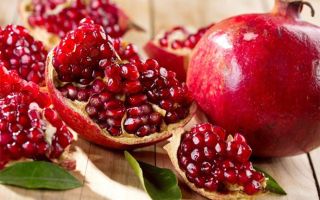Content
- 1 Chemical composition of pomegranate
- 2 Nutritional value and calorie content of pomegranate
- 3 Health benefits of pomegranate
- 4 At what age can pomegranates be given to children
- 5 Is pomegranate possible for pregnant and lactating mothers
- 6 The benefits of pomegranate for weight loss
- 7 Is pomegranate good for diabetes
- 8 Benefits of pomegranate seeds
- 9 The healing properties of the peel and membranes of pomegranate
- 10 Useful properties of pomegranate leaves
- 11 Traditional medicine recipes
- 12 Pomegranate seed oil: properties and uses
- 13 How pomegranate is used in cosmetology
- 14 How to eat pomegranate
- 15 Harm of pomegranate and contraindications
- 16 How to choose a ripe and sweet pomegranate
- 17 How to properly store pomegranates at home
- 18 Conclusion
The benefits and harms of pomegranate are an interesting question for fans of traditional medicine and healthy eating. It is necessary to find out what properties an exotic fruit has in order to understand its benefits.
Chemical composition of pomegranate
To evaluate the benefits of pomegranate, you need to familiarize yourself with the composition. Vitamin fruit contains:
- vitamins A, E, PP, presented in large quantities;
- vitamin C;
- the most valuable folic and pantothenic acids;
- vegetable sugars;
- pyridoxine and beta-carotene;
- thiamine and riboflavin;
- phytoncides;
- tannin;
- organic acids - malic, oxalic, boric and others;
- monosaccharides and disaccharides;
- tannins and nitrogenous substances;
- pectins;
- iron, chromium, calcium;
- potassium, manganese and sodium.
Nutritional value and calorie content of pomegranate
Pomegranate is a low-calorie product, from the use of which there will never be any harm to the figure. There are only 56 calories in 100 g of pulp. At the same time, carbohydrates are presented in an amount of 14.5 g, proteins - only 0.7 g, and even less fruit contains fat - only 0.6 g.

Health benefits of pomegranate
Pomegranate is highly regarded in recipes for healthy food and traditional medicine. Useful properties are that this fruit:
- strengthens blood vessels - pomegranate is good for the heart;
- has a positive effect on blood composition - pomegranate increases hemoglobin;
- acts as a prevention of tuberculosis and dysentery;
- increases the stability of immunity and generally strengthens the strength of the body;
- protects against colds and viruses;
- has a beneficial effect on the heart system and the thyroid gland;
- lowers blood pressure - the benefits of pomegranate for blood are especially valuable for hypertensive patients;
- has an anti-inflammatory effect.
Another valuable property of pomegranate is the ability to remove radioactive substances and any other toxins from the body and eliminate their harm. This is the benefits of pomegranate for the liver.
For women
Pomegranate has properties that are especially valuable for the fair sex. The benefits of pomegranate for a woman's body is that the fruit relieves painful periods and helps to regulate hormones during menopause. The vitamins and trace minerals in pomegranate improve skin and hair health.
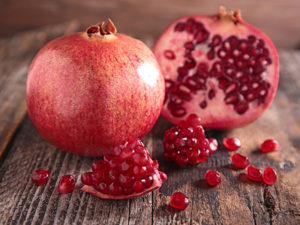
For men
The benefits of pomegranate for men's health are very great - vitamin B12 in the composition improves blood circulation and has a positive effect on potency. The benefits of pomegranate for a man's body are also expressed in the fact that the fruits strengthen, increase endurance and energy.Pomegranate is good for the heart and protects men from heart attacks.
At what age can pomegranates be given to children
Fresh vitamin fruit will certainly be useful for a child - pomegranate is used to increase hemoglobin, to strengthen immune resistance. But you can enter it into the diet no earlier than 1 year of life. The product is often allergic and harmful.
It is not pulp that needs to be offered to babies, but freshly squeezed fruit juice diluted with water. Fruits are allowed to be given only after 7 years. When used carefully, pomegranate for diarrhea for children often helps.
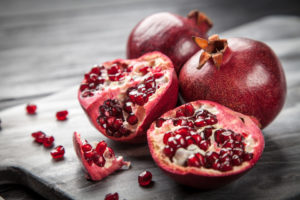
Is pomegranate possible for pregnant and lactating mothers
The fruit is highly recommended for consumption while carrying a baby. The benefits of pomegranate for pregnant women are that it protects the woman from colds, promotes the normal development of the fetus, improves the metabolism of the mother, helps to cope with anxiety and gives strength. Pomegranate during early pregnancy helps to cope with toxicosis, and pomegranate during pregnancy in the third trimester relieves severe edema.
But with pomegranate during lactation, you should be careful - it may harm the baby. It is better to return it to the diet a few months after giving birth and try only 3 to 4 grains of fruit to begin with. If the baby does not show allergies, then gradually the dosage can be increased.
The benefits of pomegranate for weight loss
Pomegranate is one of the best diet foods. The properties of the fruit accelerate the metabolism and promote the elimination of toxins, pomegranate mutes the feeling of hunger.
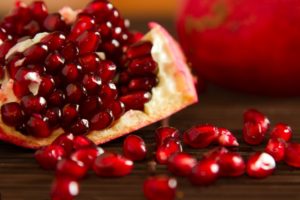
With good health, you can even arrange fasting days on pomegranates. The benefits of pomegranate fruits will allow you to lose kilograms without harm to the body.
Is pomegranate good for diabetes
With diabetes mellitus, it is not only possible to use pomegranate, but also necessary. The sugars in the product are vegetable, and even they are neutralized by vitamins, amino acids and salts. Therefore, the fruits are not harmful to health.
Pomegranate is useful for diabetes in the amount of 1 ripe natural fruit per day. In large quantities, the fruit will be harmful.
Benefits of pomegranate seeds
Properties valuable for the human body are contained not only in the pulp, but also in the pomegranate seeds. They contain fiber that promotes healthy peristalsis. The benefits of pomegranate seeds are that they contain growth hormones, which are especially beneficial for women during menopause.
The benefit of pomegranate seeds is that their regular use in decoctions and infusions helps get rid of migraines and chronic fatigue.
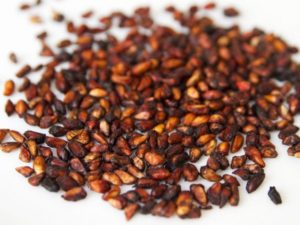
The healing properties of the peel and membranes of pomegranate
The peel of an exotic fruit can bring benefits, as well as the membranes separating the grains from each other. Homemade drinks based on membranes and rind are used to treat:
- nervous disorders;
- inflammatory diseases of the oral cavity;
- irritation and traumatic damage to the skin.
Pomegranate peel has a beneficial effect on the skin, reducing its oiliness, and helps fight acne and acne. Anthelmintic decoctions are prepared from the peels of the fruit.
Useful properties of pomegranate leaves
Another valuable part of the pomegranate is the leaves. When used in drinks, their beneficial properties:
- improve digestion;
- relieve inflammation;
- suppress appetite, which is why they contribute to weight loss.
The leaves are often used in cosmetics because they have a cleansing effect on the skin. When applied externally, the juice from pomegranate leaves promotes the healing of abrasions, wounds and scratches on the skin.

Traditional medicine recipes
Delicious and healthy pomegranate is actively used in home medicine recipes. Peels, bones and soft grains of the fruit are used to prepare medicinal drinks and formulations for external use.
Decoction of pomegranate peels
The most popular medicinal drink - a decoction - maximizes the benefits of pomegranate skins.
- Several washed pomegranates are peeled, then the white soft part is cut off from the peel, and the remaining raw material is dried in a cool, dark place.
- Dried pomegranate peels are ground in a coffee grinder or with a mortar.
- The resulting powder is poured with hot water and kept in a water bath for a quarter of an hour.
- After that, for another 40 minutes, the broth is infused under a closed lid.
Then the drink is cooled, filtered and consumed as needed. The method of administration and dosage depend on the specific disease. For instance:
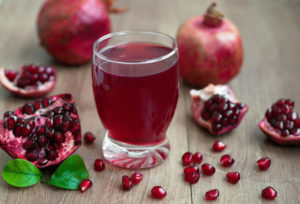
- they drink pomegranate from worms in the morning on an empty stomach, and after 2 hours they take a laxative;
- with diarrhea, you need to drink a teaspoon of broth three or four times a day;
- during a cold, drink 1 teaspoon three times a day;
- with a sore throat or dental diseases, the benefits of a decoction of pomegranate peels will appear with rinsing - they are carried out several times a day.
Alcohol tincture on pomegranate
For colds and inflammatory ailments, a tincture made with alcohol or vodka helps especially well. Prepare it like this:
- several pomegranate fruits are peeled, the grains are separated, and then squeezed to leave only small seeds;
- the pomegranate peel is cut into small pieces, and the bones are ground with a mortar in a separate bowl;
- the raw materials are mixed, grated lemon peel is added, poured into a glass vessel;
- pour vodka or alcohol on top;
- add a pinch of cinnamon to the tincture;
- close the lid or stopper tightly and remove the vessel to a dark place.

The remedy is infused for 20 days, while every day the vessel with the tincture must be taken out and shaken up so that the benefits of pomegranate seeds and peels show themselves in the tincture as much as possible. After the product is ready, filter it. They drink the tincture in very small quantities so as not to get harm - no more than 1 large spoon 1 or 2 times a day, shortly before eating.
Alcohol tincture serves as an excellent fortifying agent - it can be taken for 2 - 3 weeks in a row as a prevention of colds. Also, its properties help with already begun respiratory diseases. Tincture can disinfect abrasions and cuts.
Infusion of pomegranate peels
The benefits of pomegranate peel for the body are manifested not only in decoctions, but also in infusions - the beneficial properties are retained in full. The peel is pre-dried, then poured with boiling water and insisted under the lid for 5 hours. After this, the agent must be filtered.
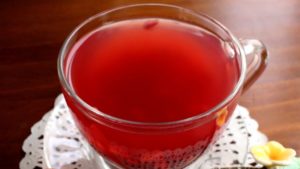
The infusion is used mainly for gargling for sore throat and sore throat.
- If you add 1 small spoonful of ground ginger to the finished product, you get a good dry cough remedy that will help thin phlegm.
- Wounds on the skin are often rubbed with pomegranate infusion - the remedy not only has a disinfecting effect, but also helps to stop bleeding.
Tea with pomegranate peels
The benefits of pomegranate peels for the body will appear if you brew aromatic and tasty tea on their basis.
- A common brewing method is adding a few dry or fresh rinds to the finished black tea. Pomegranate peels go well with lemon, herbs and mint, you can drink tea with both sugar and honey.
- You can also make pomegranate tea based on the peels alone. To do this, pour boiling water over them and stand for about a quarter of an hour, and then strain and add milk, honey or spices to add aroma and taste.

The benefits of pomegranate peel tea are that the drink is an ideal preventive and curative remedy for winter colds.
In addition to the drink on the crusts, there is a tea made from pomegranate petals - it is usually brewed on the basis of traditional black tea, and the petals are added to the finished drink. The benefit of pomegranate flower tea is that it has a beneficial effect on the condition of the stomach, strengthens the immune system and has a good effect on the nervous system. Pomegranate tea is useful for gastritis.
Pomegranate seed powder
The beneficial substances contained in pomegranate seeds fully reveal their qualities, if you grind them into a fine powder. Previously, the bones need to be dried in the oven at 120 degrees for 6 hours.
The home remedy can then be used to treat:
- toothache - 4 large spoons of powder are mixed with 2 large spoons of liquid honey, the mixture is kept for 10 minutes, and then thoroughly chewed so that the paste evenly covers the entire mouth;
- worms - half a tablespoon of the powder is diluted in a glass of pineapple juice and drunk three times a day.
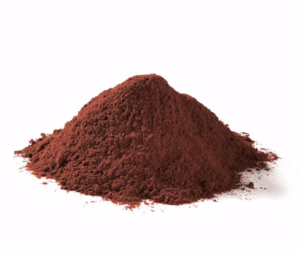
Pomegranate seed oil: properties and uses
Not only powder is obtained from pomegranate seeds, but also healing oil - although you can buy it only in a pharmacy, you will not be able to prepare the remedy at home. The properties of the oil help against high blood pressure, lower bad cholesterol, and have a beneficial effect on diabetes and obesity.
With internal use, a few drops of the drug are kept under the tongue for a couple of minutes, and then swallowed - this way the substance is absorbed into the blood faster and better. Outwardly, the oil is used in cosmetics - it saturates the skin with vitamins and slightly rejuvenates.
How pomegranate is used in cosmetology
The benefits of pomegranate seeds and peels are actively used in home cosmetic recipes. Masks and scrubs, creams and lotions, hair conditioners are made on the basis of raw materials.
Facial masks and scrubs
The benefits of pomegranate are that it regulates the level of oily skin of the face, has a cleansing, moisturizing and rejuvenating effect.

To deeply cleanse the skin, remove dead skin particles and moisturize the epidermis, you need:
- mix 3 teaspoons of crushed pomegranate seeds with 2 teaspoons of honey;
- spread over the face with gentle massage movements for 20 minutes.
The properties of the mask will bring the maximum effect if you do it twice a week.
Hair beauty pomegranate
The beneficial substances present in pomegranate not only strengthen the hair, but also give it softness and volume. The following recipe is popular:
- pomegranate seeds and peel obtained from a quarter of the fruit are crushed in a blender;
- add 1 teaspoon of flaxseed oil, glycerin and corn starch to them;
- then a few drops of vitamin D are added to the mixture;
- then the mask is thoroughly mixed, distributed through the hair for half an hour, and then washed off.
Hair after such a mask will acquire extraordinary softness.
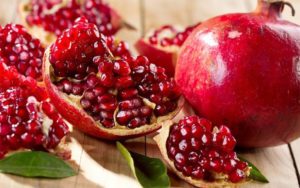
How to eat pomegranate
The main rule of eating fruit is very simple - pomegranate cannot be eaten on an empty stomach, with severe hunger. The properties of the fruit will irritate the stomach. You also need to know how to properly peel an exotic fruit.
How to properly clean a pomegranate
So that when cleaning the pomegranates it does not splash with juice and does not stain fingers and clothes, you need to do the following:
- cut off the upper and lower protruding parts of the washed pomegranate;
- make four neat cuts on the peel on all sides of the fruit, being careful not to touch the grains;
- dip the pomegranate into a container of cold water and break it with your hands along the incisions made.
After that, the grains of fruit are separated from the peel and membranes right in the water and allowed to sink to the bottom of the dish. Then you just have to remove the peel and carefully drain the water through a colander.
Is it possible to eat pomegranate with seeds
Pomegranate seeds are very useful, so they can be consumed in small quantities even in unmilled form. They will not be completely digested, however, there will be no harm, and the intestines will be able to assimilate valuable fiber.
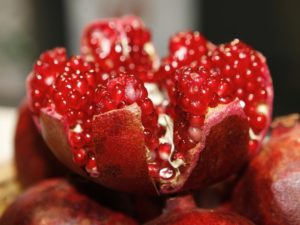
Eating pulp with seeds should be very careful - they are hard and can be harmful by scratching the mucous membrane or damaging the tooth enamel.
How much pomegranate can you eat per day
The benefits and harms of pomegranate for the human body depend on the rate of use. In order for the fruit not to be harmful, it should be consumed in an amount of no more than 1 average fruit per day.
Harm of pomegranate and contraindications
Pomegranate can be harmful to the body. You cannot use it when:
- individual intolerance to the product;
- increased sensitivity of tooth enamel;
- acute gastric ailments - fresh pomegranate is prohibited for gastritis and ulcers;
- hemorrhoids;
- diseases of the pancreas - pomegranate should be excluded for pancreatitis;
- acute pulpitis.
Does pomegranate raise or lower blood pressure? The properties of the fruit have an effect that reduces blood pressure - therefore, with hypotension, it must be used with caution, as harm is possible.
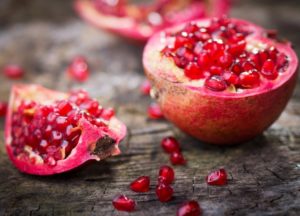
How to choose a ripe and sweet pomegranate
It is very easy to purchase a quality, tasty and healthy fruit.
- First of all, you need to look at the mass - the heavier the fruit, the tastier it is.
- It is recommended that you apply light pressure to the peel with your fingers to make sure the pomegranate is not too soft or too hard.
- The rind should be bright, uniform and smooth - no cracks, dents or dark spots.
The brighter the pomegranate, the tastier and healthier it will be.
How to properly store pomegranates at home
Pomegranate is a fruit that can be stored for several months without losing its properties. But you need to keep it only in the refrigerator, at low temperatures no higher than 2 degrees, wrapped in thick paper.
If the pomegranate is kept dry and cold, then, depending on the variety, it can be stored from six months (sweet pomegranate) to 10 months (sour pomegranate).
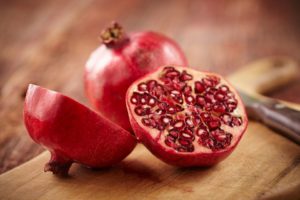
Conclusion
The benefits and harms of pomegranate are a matter of its careful and competent use. If there are no strict contraindications, and the permissible daily norms are not exceeded, then the pomegranate will be very useful for the whole body.

